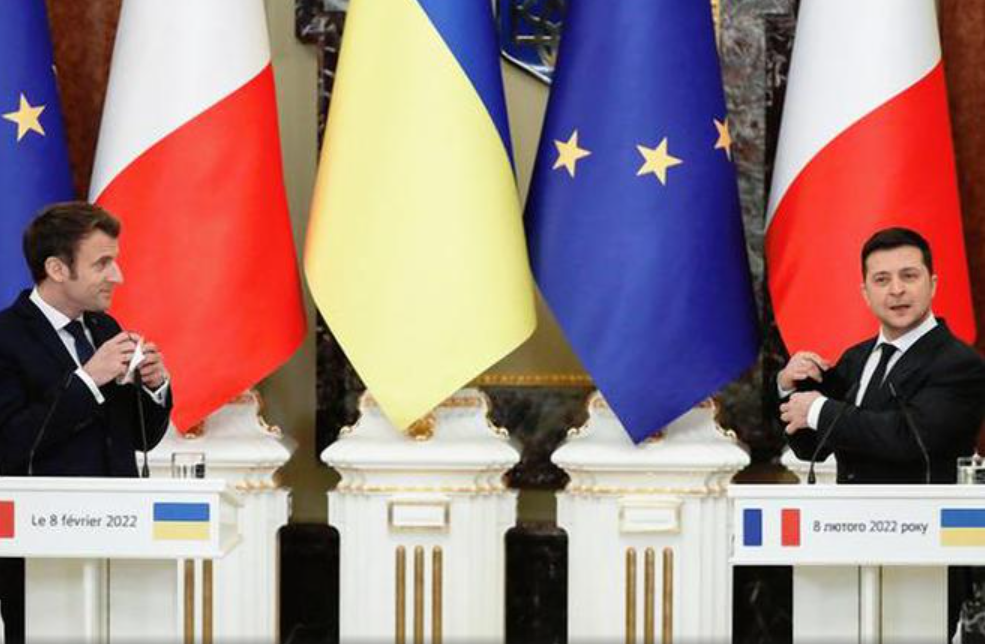Tue Feb 15, 2022
Tuesday / February 15
Zelensky adress
In an address to the nation Monday night, Ukrainian President Volodymyr Zelensky urged Ukrainians to hang national flags on buildings and sing the national anthem together on February 16 that has been cited by the Western media as the start of a possible Russian invasion.
Ukrainian officials emphasized that Zelensky did not foresee an attack at that time, but responded to the reports in the US-based foreign media with irony and suspicion. "They tell us that February 16 will be the day of the attack. We will make it a day of unity," Zelensky said in his video to the nation.
While he believes Russia is threatening his country, Zelensky has long said that the possibility of an imminent attack by his Western allies has been exaggerated.
Mykhailo Podolyak, one of Zelensky's advisers, told Reuters that the president, in his historic remarks, responded with some "irony" to media reports about the possible invasion.
Zelensky's office issued a decree Wednesday calling for all villages and towns in Ukraine to fly the country's flags and for the entire nation to sing the national anthem at 10:00 am.
US officials reiterated that they have yet to see an attack order by Russian President Vladimir Putin on a given day, but repeated warnings that an attack could come at any time.
Washington, which has already sent most of its diplomats home, is relocating its remaining diplomatic mission in Ukraine from the capital Kiev, to the western city of Lviv, much farther from the Russian border, US Secretary of State Antony Blinken said.
Trudeau's choice
Canadian Prime Minister Justin Trudeau said on Monday he will activate emergency powers, including cutting funding, to end anti-covid trucker protests in parts of the capital.
The liberal government has taken sweeping measures to bolster police forces and crowdfunding platforms under terrorist financing control, saying working-class protests against masks and vaccinations are hurting the economy and Canada's reputation as a trusted trading partner.
The 1988 Emergencies Act allows the federal government to override provincial powers and take special temporary measures to ensure safety during national emergencies. The law had previously been used only once in peacetime, in 1970, by Trudeau's father, former Prime Minister Pierre Trudeau.
Earlier on Monday, four provincial premiers in Alberta, Quebec, Manitoba and Saskatchewan said they were opposed to plans to appeal the law, saying it was unnecessary. States have recently abandoned their covid rule regimes under protests and popular pressure.
The Canadian Parliament, which also has the power to revoke the government's powers, will vote on the use of emergency measures within seven days.
Iran's nuclear program
Marathon talks in Vienna to revive the 2015 international powers' nuclear deal with Iran continue to make slow progress. Iran accuses the United States of refusing to take the necessary political decisions to embed the deal in international law or expand the scope of economic sanctions to be lifted.
Ali Shamkhani, secretary of Iran's national security council, explained in multiple-language tweets that progress had become "increasingly difficult" after speaking with the Tehran government's negotiators in Vienna, saying the United States continued to propose new initiatives designed primarily to evade commitments.
"The United States is not trustworthy and therefore objective guarantees must be obtained so that international law and relations are not once again ridiculed by the US government," said State Department spokesman Saeed Khatibzadeh.
The Russian ambassador to the talks, Mikhail Ulyanov, adopted a less pessimistic tone. He said talks are in the final stages and "significant progress" has been made. Despite the Ukrainian tensions between his country and the US, Ulyanov continues to play a close mediator role between the US and Iran. Wang Qun, China's Ambassador to the UN in Vienna, also broke the silence at the weekend and said that the talks were in the process of being concluded.
US President Joe Biden is facing growing political resistance from Republican senators, who insist that the president cannot evade Congress by refusing to put any new deal to a vote.
US stocks
The Dow Jones Industrial Average and S&P500 slumped on Monday amid tensions between Russia and Ukraine as the Fed will enter a rate hike regime.
The Dow fell 171.89 points to 34,566.17 points, driven by losses in Walgreens Boots Alliance and Chevron. The S&P500 fell 0.4% to 4,401.67, while the tech-heavy Nasdaq Composite closed less than a point down at 13,790.92. The Nasdaq was up nearly 1% at the start of the session.
Investors are watching the headlines about the Russia-Ukraine conflict.
Known as Wall Street's fear indicator, the Cboe Volatility Index briefly hovered around 31 in afternoon trading, approaching session highs, closing the day at over 28 points.
